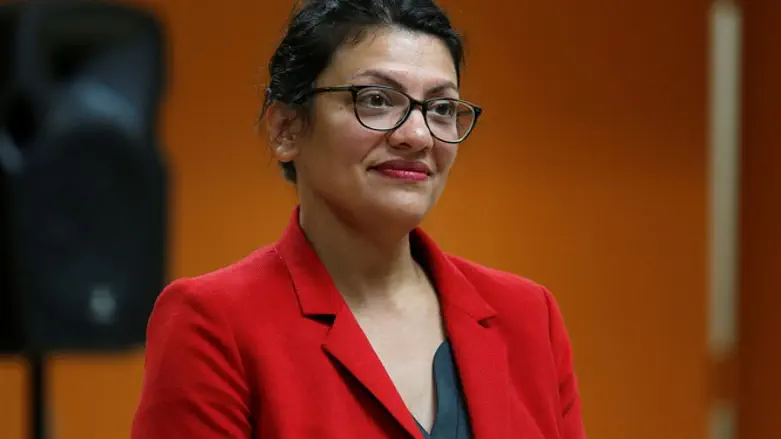
Rep. Rashida Tlaib (D-MI) argued in an interview with a local Jewish outlet in Detroit that she is not anti-Semitic while adding that her position on Israel has been “misinterpreted or not fully understood” by the media.
“If people saw me more as a granddaughter, versus a congressmember, they would understand why I have said we need to push for true equality and justice in Israel,” Tlaib said in an interview with The Detroit Jewish News, as quoted by Jewish Insider.
“The lens I bring to the issue is something I hope people welcome because I don’t think there has ever been a member of Congress with a living grandmother or relatives in the occupied territories of Israel. I hope people see an opportunity, not something negative,” she added.
Tlaib also claimed that she has not intended to make Middle East politics a major focus of her tenure in Congress, but that she is frequently asked about the issue.
“I get asked more about the issue of Palestine than my BOOST Act, more than the other issues. That’s unfortunate, but I’ve been very good about pivoting and saying, ‘Well, we need access to water, from Gaza to Detroit,’” said Tlaib, adding, “I don’t think I would be as passionate but for my Palestinian roots, for the fact I grew up in [Detroit] and have seen, firsthand, people’s oppression and the struggle of being a child of immigrants.”
Tlaib also argued that criticism of her as anti-Semitic is in bad faith.
“I think some of it is anti-Arab. It’s anti-Palestinian…. My mere existence created this tension of, ‘She must be this way. This is who she is. This is how all Palestinians are,’” she said. “Before I even opened my mouth, as soon as I won, it was just complete attack. And it was anti-Palestinian, anti-Arab movement. Not as much Muslim. The white supremacists, those folks came after.”
Tlaib defended her calls for a one-state solution by claiming that current conditions in Israel make a two-state solution unviable.
“The two-state [solution] is almost impossible now around the racist policies of [Prime Minister Binyamin] Netanyahu — that [a] two-state would be impossible without actually hurting Israelis,” she said. “If you think about some of the Israeli families [who] have been in those communities for almost five decades, is the solution to push them out and recreate that kind of hurt? I just don’t know how you uproot people yet again.”
Tlaib added that she sees herself and the Jewish community as fighting common enemies in white supremacists.
“White supremacy is really what brings us all together… When we talk about anti-Semitism, when we talk about anti-Blackness, anti-immigrant, it’s all of us together fighting against the same people. Because when you open that curtain, it’s the same folks coming after all of us,” she argued.
Asked about recent Black Lives Matter and “Day of Rage” protests that targeted synagogues and sites like a statue of Raoul Wallenberg in Los Angeles, Tlaib avoided directly addressing the incidents.
“In the 13th congressional district, we have done more intersectional work on achieving justice and fighting against oppression from Detroit to Gaza than most communities,” she said. “We come from a place of love when we fight for equality and justice for all. I hope this type of work can be spread across the country.”
Since being elected, Tlaib has several times caused uproars with anti-Israel statements.
Tlaib claimed in an interview last year that Palestinian Arabs living in the British Mandate prior to the establishment of the State of Israel “provided” a safe haven to Jews after the Holocaust.
In addition, when asked in a past television interview whether she would vote against military aid to Israel when she goes to Congress, Tlaib replied, “Absolutely.”
In August, Israel announced it would bar entry to Tlaib and fellow Muslim Congress woman Ilhan Omar over their support for the anti-Israel Boycott, Divestment and Sanctions (BDS) movement.
In December, Tlaib appeared to blame the Jersey City shooting on “white supremacy” even though the attackers had been identified as members of an extremist “anti-white and anti-Semitic” movement.
A month later, she retweeted, then removed, a tweet falsely blaming Israelis for the death of an Arab child in eastern Jerusalem.
More recently, Tlaib tweeted an acknowledgement of Nakba Day, a day commemorated by Palestinian Arabs to mark what they call the “catastrophe” of the establishment of the State of Israel.
(Arutz Sheva’s North American desk is keeping you updated until the start of Shabbat in New York. The time posted automatically on all Arutz Sheva articles, however, is Israeli time.)